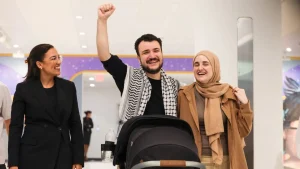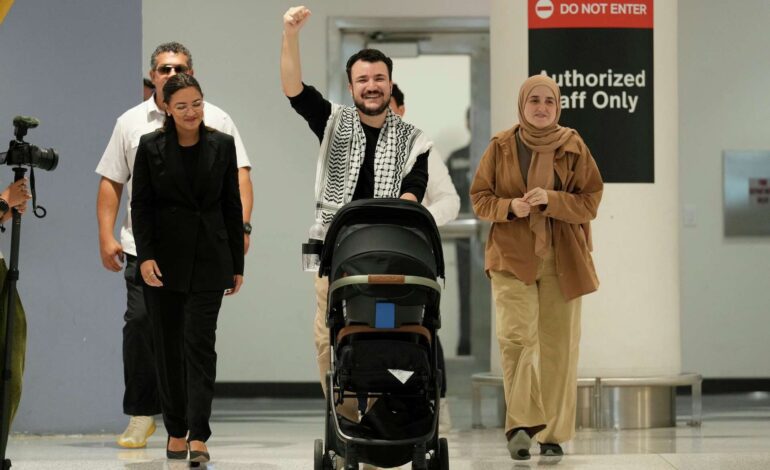NEW YORK — A federal judge in New Jersey has ordered the release of Columbia University student Mahmoud Khalil from immigration detention, marking a major civil rights victory for pro-Palestinian advocates amid an escalating crackdown by President Trump’s administration, which has accused campus demonstrators of anti-Semitism.
Khalil’s legal team had petitioned U.S. District Judge Michael Farbiarz to release him on bond from a detention facility in Louisiana, or at minimum, transfer him to New Jersey to be closer to his wife and newborn child, according to the Associated Press.
Khalil was the first student arrested under the Trump administration’s crackdown on campus protests against Israel’s war on Gaza in spring 2024. His arrest on March 8 at his Columbia University dorm in New York turned him into a symbol of the protest movement and a national figure for free speech advocates.
Secretary of State Marco Rubio had previously called for Khalil’s deportation, alleging that his continued presence posed a threat to U.S. foreign policy. His green card was subsequently revoked in preparation for removal proceedings.
However, in a ruling issued last Friday, Judge Farbiarz found that the federal government could not justify Khalil’s continued detention on the basis of foreign policy interests. He was released on Saturday.
The judge criticized the government’s use of a rarely invoked provision of U.S. immigration law that allows the secretary of state to request deportation of a non-citizen deemed contrary to U.S. foreign policy interests. He ruled this an infringement on Khalil’s First Amendment rights.
“The petitioner’s career and reputation are being harmed, and he is being denied his right to speak freely,” Farbiarz wrote.

According to NBC News, the Trump administration immediately filed a notice of appeal. Judge Farbiarz, meanwhile, ordered Khalil to surrender his passport and green card to ICE officials in Louisiana as a condition of his release. His travel is now restricted to five jurisdictions: New York and Michigan to visit family, Louisiana and New Jersey for court proceedings and Washington, D.C.
Khalil was never charged with any crime related to the Columbia University protests. A graduate student in international affairs, he served as a spokesperson and negotiator on behalf of student protesters. His high-profile presence in the media and outspoken support for Palestine made him a target, despite not being arrested at the protests themselves.
The Trump administration claimed that non-citizens who participate in such demonstrations should be deported, labeling their views “anti-Semitic.”
“This ruling affirms a core First Amendment principle: the government cannot misuse immigration laws to punish speech it disagrees with,” said Noor Zafar, senior attorney with the ACLU, which supported Khalil’s case.
Khalil was arrested by ICE over his alleged role in leading pro-Palestine demonstrations and denouncing Israel’s genocide in Gaza. The Columbia protests quickly spread to more than 50 U.S. campuses, until law enforcement began dismantling solidarity encampments and arrested more than 3,100 protesters, most of them students and faculty.
A breath of freedom
After more than 100 days in ICE detention in Louisiana, Khalil walked out of the facility wearing a Palestinian keffiyeh and raising his fist in defiance. He condemned what he called the Trump administration’s “racist immigration policies” and said he was leaving behind hundreds of detained men who shouldn’t be imprisoned.
“Justice prevailed — but far too late,” Khalil told reporters. “This never should have taken three months. Trump tried to suppress support for Palestine, and he failed.”
In an interview with the New York Times the next day, Khalil said he remains committed to advocating for Palestinian rights despite what he endured while detained in the U.S. He stressed that none of his actions during the protests were anti-Semitic, contrary to government claims.
“I was defending my people’s rights, calling for an end to genocide and demanding that tuition money not be invested in weapons manufacturers,” Khalil said. “What part of that is anti-Semitic?”
Khalil, who was born in Syria and is of Palestinian heritage, said he never imagined his advocacy would land him in detention. But his fears grew after Trump assumed office.
He recalled being crammed into a cell with more than 70 others in Louisiana, lacking privacy and basic dignity. He said he missed his child’s birth and couldn’t get back the lost moments with his wife, Dr. Nour Abdullah.
“This experience won’t silence me — it only deepens my commitment to justice for Palestinians,” he said.
Khalil added that his detention opened his eyes to another America.
“Once you’re in there, you see a different reality. One that doesn’t reflect the values of freedom and justice this country claims to uphold.”
Rally and reaffirmation
At a rally outside Columbia University on Sunday, Khalil addressed supporters alongside U.S. Rep. Alexandria Ocasio-Cortez (D-NY). He said the students who were arrested for their activism would continue to stand for Palestine.
Khalil plans to live with his wife and their infant son, who was born while he was imprisoned. Dr. Abdullah released a statement:
“This decision does not erase the injustice the Trump administration inflicted on our family and so many others. But today, we celebrate Mahmoud’s return to New York and to the community that has supported us since the day he was wrongfully detained for advocating for Palestinian freedom.”
Legal battle continues
Despite the court’s ruling, the White House stated that the federal case against Khalil would proceed. He faces allegations of fraudulently obtaining a student visa and concealing information about previous employment with UNRWA, the United Nations Relief and Works Agency for Palestine Refugees.
Khalil’s attorneys deny these claims, noting that such charges rarely result in detention. Judge Farbiarz also criticized the federal government’s actions.
“It is extremely unusual for the federal government to imprison an immigrant over alleged errors in a green card application,” he said.
Khalil, 30, became a lawful permanent U.S. resident last year. His wife and newborn son are U.S. citizens.






Leave a Reply